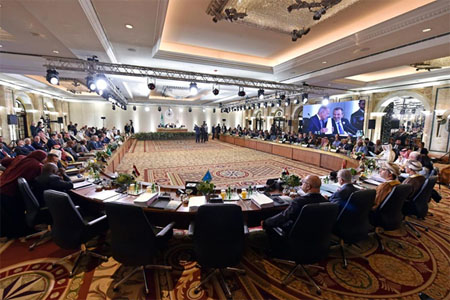
general view shows the Foreign Ministers of Arab countries during a meeting of the Arab Economic and Social Development Summit at Phoenicia hotel in Beirut, Lebanon. EPA
Afrasianet-As the Arab League’s fourth Economic and Social Development Summit officially kicked off Saturday amidst a disappointing turn out, Syria’s absence from the summit was the main topic of conversation, eclipsing the 29 articles on the agenda such as poverty, the role of women, food security and trade.
Since Syrian President Bashar Al Assad regained control of most of the country after an eight-year-long civil war, several Lebanese politicians, including Foreign Minister Gebran Bassil, are calling for Syria’s reintegration into the Arab League. Syria’s membership was suspended in late 2011 after bloodshed sparked by anti-government protests.
“Syria is the biggest absentee in our conference ... Syria should be in our arms rather than throwing it in the arms of terrorism,” Mr Bassil said in his speech Friday. “We should not wait to get permission for its return so that we don’t commit a historic shame by suspending a member because of external orders.” Last week, Iraqi Foreign Minister Mohamed Alhakim also said he supported Syria’s return to the Arab League.
Lebanese newspaper Al Joumhouria reported on Friday that Mr Bassil invited the Syrian ambassador to Lebanon, Ali Abdul Karim, to attend the summit but he declined, saying that the Arab League’s position regarding Syria was “not correct”.
The Arab League has resisted Lebanon’s lobbying so far. In a joint press conference with Mr Bassil on Friday afternoon, Arab League Secretary General Ahmed Aboul Gheith explained that Arab states still disagree on whether Syria should be reinstated or not.
However, in an earlier, separate press conference, assistant secretary general of the Arab League, Hossam Zaki, seemed to be more open the idea. “The return is inevitable. Syria has not lost its seat," he said, pointing out that Syria had only been suspended, not expelled.
Several Lebanese commentators have already called the summit a “failure” because several heads of state, particularly from the Gulf, pulled out at the last minute.
At least eight heads of state were originally expected in Beirut, but only two presidents, from Mauritania and Somalia, had confirmed their presence by Friday.
In a surprise move, Qatari emir Sheikh Tamim Al Thani confirmed on Saturday that he would arrive in Lebanon the next day to head his country’s delegation.
The UAE delegation is headed by its Economy Minister, Sultan Al Mansouri.
What has become known as “the flag incident” discouraged many heads of state from attending.
Reviving a 40-year old dispute, Hezbollah’s ally Amal removed a Libyan flag to replace it with a party flag a few days before the summit, sparking outrage in Libya which decided to boycott the event.
Amal accuses Libya of being uncooperative about solving the mysterious disappearance of party founder and cleric Musa Sader in Libya back in 1978.
The Lebanese deputy speaker of Parliament, Elie Ferzli, defended Amal’s leader Nabih Berri – also speaker of parliament – on Saturday, arguing that the low turnout was because of the absence of government in Lebanon and not because of the dispute with Libya.
Lebanon has not been able to form a cabinet since the May 2018 parliamentary elections.

